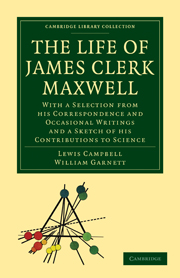 The Life of James Clerk Maxwell
The Life of James Clerk Maxwell Book contents
- Frontmatter
- PREFACE
- Contents
- LIST OF ILLUSTRATIONS
- PART I BIOGRAPHICAL OUTLINE
- CHAPTER I BIRTH AND PARENTAGE
- Note.—The Clerks of Penicuik and Maxwells of Middlebie
- CHAPTER II GLENLAIR—CHILDHOOD—1831-1841
- CHAPTER III BOYHOOD—1841-1844
- CHAPTER IV ADOLESCENCE—1844-1847
- Note.—Oval and Meloid
- CHAPTER V OPENING MANHOOD—1847-1850
- CHAPTER VI UNDERGRADUATE LIFE AT CAMBRIDGE—1850-1854
- CHAPTER VII BACHELOR-SCHOLAR AND FELLOW OF TRINITY—1854-1856
- CHAPTER VIII ESSAYS AT CAMBRIDGE—1853-1856
- CHAPTER IX DEATH OF HIS FATHER—PROFESSORSHIP AT ABERDEEN—1856-1857
- CHAPTER X ABERDEEN—MARRIAGE—1857-1860
- CHAPTER XI KING'S COLLEGE, LONDON—GLENLAIR—1860-1870
- CHAPTER XII CAMBRIDGE—1871-1879
- CHAPTER XIII ILLNESS AND DEATH—1879
- CHAPTER XIV LAST ESSAYS AT CAMBRIDGE
- PART II CONTRIBUTIONS TO SCIENCE
- PART III POEMS
- INDEX
- Plate section
CHAPTER XIII - ILLNESS AND DEATH—1879
Published online by Cambridge University Press: 05 July 2011
- Frontmatter
- PREFACE
- Contents
- LIST OF ILLUSTRATIONS
- PART I BIOGRAPHICAL OUTLINE
- CHAPTER I BIRTH AND PARENTAGE
- Note.—The Clerks of Penicuik and Maxwells of Middlebie
- CHAPTER II GLENLAIR—CHILDHOOD—1831-1841
- CHAPTER III BOYHOOD—1841-1844
- CHAPTER IV ADOLESCENCE—1844-1847
- Note.—Oval and Meloid
- CHAPTER V OPENING MANHOOD—1847-1850
- CHAPTER VI UNDERGRADUATE LIFE AT CAMBRIDGE—1850-1854
- CHAPTER VII BACHELOR-SCHOLAR AND FELLOW OF TRINITY—1854-1856
- CHAPTER VIII ESSAYS AT CAMBRIDGE—1853-1856
- CHAPTER IX DEATH OF HIS FATHER—PROFESSORSHIP AT ABERDEEN—1856-1857
- CHAPTER X ABERDEEN—MARRIAGE—1857-1860
- CHAPTER XI KING'S COLLEGE, LONDON—GLENLAIR—1860-1870
- CHAPTER XII CAMBRIDGE—1871-1879
- CHAPTER XIII ILLNESS AND DEATH—1879
- CHAPTER XIV LAST ESSAYS AT CAMBRIDGE
- PART II CONTRIBUTIONS TO SCIENCE
- PART III POEMS
- INDEX
- Plate section
Summary
After his recovery from the attack of erysipelas at Glenlair in 1865, Maxwell's health appears to have been fairly good until the spring of 1877. He then began to be troubled with dyspeptic symptoms, especially with a painful choking sensation after taking meat. He consulted no one for about two years. But one day in 1877, on coming into the Laboratory after his luncheon, he dissolved a crystal of carbonate of soda in a small beaker of water, and drank it off. A little while after this he said he had found how to manage so as to avoid pain. The trouble proved obstinate, however, and at last, on the 21st of April 1879, he mentioned it when writing to Dr. Paget about Mrs. Maxwell.
By this time his friends at Cambridge had begun to observe a change in his appearance, and some failure of the old superabundant energy. They missed the elasticity of step, and the well-known sparkle in his eye. During the Easter Term of 1879 he attended the Laboratory daily, but only stayed a very short time. At the end of the term he remarked that he had been unable to do much more than to give his lectures. And before leaving Cambridge for the vacation, he was more than once very seriously unwell.
In June he returned, as usual, to Glenlair. His letters continued to be marked by humorous cheerfulness, and, as was always the case, contained information about everything and everybody except himself.
- Type
- Chapter
- Information
- The Life of James Clerk MaxwellWith a Selection from his Correspondence and Occasional Writings and a Sketch of his Contributions to Science, pp. 406 - 433Publisher: Cambridge University PressPrint publication year: 2010First published in: 1882


